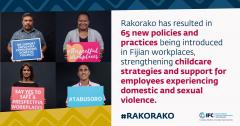A programme aimed at addressing persistent and widespread gender gaps in the workplace in Fiji helped a raft of companies maintain operations amid the COVID-19 pandemic, with some reporting a lift in business performance.
The Rakorako programme, an initiative of the International Financial Corporation (IFC) and Fiji Human Resources Institute (FHRI), has already resulted in 65 new policies and practices being introduced in Fijian workplaces, strengthening childcare strategies as well as domestic and sexual violence support for employees, according to a survey of participating companies. The survey results, contained in a report released today, show more than 6,000 employees have benefited from the programme.
Fiji is among the most gender unequal countries in the world. Female labour force participation is 38 percent, versus 77 percent for men. Fiji also has among the highest rates of gender-based violence in the world, with as many as 52 percent of women reporting an experience of violence from an intimate partner.
“It has been encouraging to see a concerted effort from the Fiji private sector to take part in this training and seek to create a safer and more equal workplace for their employees, and in particular for women,” said Kameli Batiweti, President, Fiji Human Resources Institute. “The results of the Rakorako programme show that gains in gender equality and implementing support mechanisms for staff faced with domestic and sexual violence not only improves their lives but also makes good business sense.”
The programme was launched in November 2019. When the COVID-19 pandemic struck Fiji, organisers were able to pivot by using innovative methods to blend online and in-person engagement. Content shifted as well, and new materials on flexible working practices and mental health support were added to meet the increasingly urgent needs from businesses on these topics. Early evidence suggests the pandemic has only exacerbated the incidence of domestic and sexual violence.
Almost half of the companies that took part reported the programme helped them maintain business continuity and increase productivity or efficiency even as Fiji was experiencing the first waves of COVID-19. Almost half reported reduced absenteeism.
“The Rakorako programme has helped businesses to create more flexible, family-friendly and respectful workplaces,” said Australian High Commissioner to Fiji, John Feakes. “Australia is pleased to support this important work, which has already shown positive results.”
About 80 percent of participating companies improved their workplace culture, with the program also prompting wider discussion and awareness in Fiji’s private sector of issues around respectful workplaces and child¬care. More than two-thirds of participating companies said it had enhanced their ability to address bullying and/or sexual harassment.
“New Zealand is keen to support Fiji as the country responds to the impacts of the COVID-19 pandemic, including by addressing issues that will lead to productivity and economic growth,” said New Zealand High Commissioner to Fiji, Jonathan Curr.“The Rakorako programme shows there is a strong business case for creating more gender equal workplaces in Fiji. Improving awareness of this is key to raising women’s low rate of economic participation.”
The Rakorako programme was based on the findings of two IFC studies in Fiji on childcare and workplace responses to domestic and sexual violence. Those studies demonstrated the business case for the private sector to take action in developing workplace responses to domestic and sexual violence.
“With COVID-19 exacerbating gender gaps around the globe, including in Fiji, and putting further pressure on women who overwhelmingly carry the burden of childcare and are more likely to be victims of domestic and sexual violence, this innovative programme has been timely,” said Kim-See Lim, IFC Regional Director for East Asia and Pacific. “Breaking down barriers that limit opportunities for women and girls is a priority for IFC in our work in the Pacific. An environment that encourages and incentivises women’s work creates economic opportunities that make women more resilient throughout their lives and careers and also makes for a stronger and more resilient recovery for the region’s economies.”
IFC’s work in Fiji is supported by the Australian and New Zealand Governments through the Fiji Partnership. The lessons learned through implementing Rakorako will also underpin the design of the next Fiji Women’s Employment project and other women’s employment interventions across the region.
SOURCE: IFC/PACNEWS















